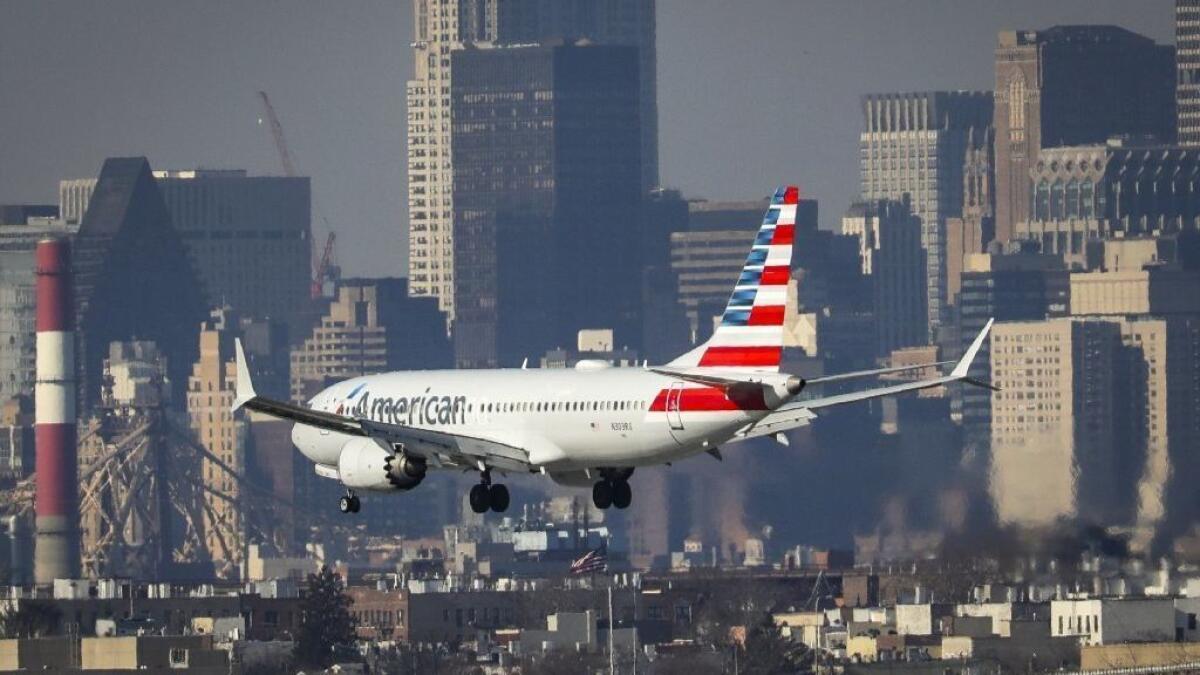The 737 Max fallout poses a risk to Boeing’s finances — and its reputation

The twin-engine 737 is Boeing Co.’s most-produced jetliner and a workhorse of the aviation industry, with airlines worldwide piling up orders for more than 5,000 of its newest version, the 737 Max.
Boeing delivered 580 of the 737s last year, including 256 of the Max versions, which amounted to 72% of its total airplane deliveries. One of the nation’s largest carriers, Southwest Airlines, flies only 737s.
But with the 737 Max under intense global scrutiny after two fatal crashes since October, Boeing now faces a quickly escalating threat to its reputation and financial health.
“The pressure is ramping up and Boeing’s reputation is at risk,” said Jim Corridore, an analyst at CFRA Research. “How Boeing reacts to this, how long it takes to fix this problem and whether people feel safe flying in their planes are unknown at this time.”
Many investors weren’t waiting to find out. As a growing number of aviation regulators grounded 737 Max flights, including flights across all of Europe, investors Tuesday continued dumping Boeing’s shares, which tumbled $24.60, or 6.2% to $375.41 after dropping 5.3% on Monday.
The two-day losses wiped out $30 billion of the aerospace company’s market value.
The problems could intensity if the Federal Aviation Administration follows the overseas regulators and decides to halt 737 Max flights in the United States. But the agency said Tuesday that its review “provides no basis to order grounding the aircraft.”
Boeing also was steadfast, saying Tuesday, “We do not have any basis to issue new guidance to operators” and that it has “full confidence in the safety of the 737 Max.” Southwest also said it had no changes planned for its 737 Max fleet.
All of which drew criticism from some analysts.
“There is no upside for the airlines that operate that plane in this country, and for Boeing, and for the FAA for not stepping up to this immediately” with a similar flying halt, said Kevin Mitchell, chief executive of the Business Travel Coalition, an advocacy group for business fliers.
“What the Europeans did raises everything to a whole new level,” Mitchell said.
Some Boeing analysts said that, so far, Boeing should not be hurt financially except for its share-price drop.
Corridore sent a note to clients saying that although “the news flow remains bad for Boeing,” he thinks “these issues will, over time, be overcome with the plane likely to resume service, and orders and backlog likely to remain intact for the most part.”
Foreign aviation authorities have taken precautions after an Ethiopian Airlines 737 Max crashed Sunday shortly after takeoff in Ethiopia, killing 157 people. That followed a crash of a 2-month-old Lion Air 737 Max in October after it took off from Jakarta, Indonesia, killing 189 people.
There have been cases in which an airplane and its manufacturer suffered a hit to their reputation from deadly accidents, such as the DC-10 wide-body jetliner that was built by McDonnell Douglas Corp. before the company merged with Boeing in 1997.
An American Airlines DC-10 crashed shortly after takeoff in Chicago in 1979, killing 273 in what is still the deadliest crash in U.S. history and prompting the FAA to temporarily ground DC-10 flights. Within five years, orders for the plane had all but evaporated.
But aviation journalist Seth Kaplan noted that the Chicago crash was only one reason why demand dried up for the DC-10. “The plane also was becoming obsolete economically” as smaller, more fuel-efficient aircraft emerged, he said.
Conversely, the 737 is “an extraordinarily popular airplane,” Kaplan said, adding that over the long term, Boeing’s reputation and financial health shouldn’t be badly hurt “as long as they solve this, because the fundamental economics of the 737 program are so very good.”
Boeing said that, as of last month, it had delivered 376 of the 737 Max versions and had orders for an additional 5,012 from more than 80 airlines worldwide. The 737 Max 8 model has a list price of $110 million, “but airlines often receive substantial discounts,” Corridore said.
Boeing’s entire commercial airplanes group contributed 60% of the Chicago company’s $101 billion in revenue last year and 66% of Boeing’s $12 billion in operating earnings. Boeing also has a major aerospace and defense business.
S&P Global Ratings said Monday it was not changing its ratings on Boeing’s debt despite the grounding of the plane by other countries, and S&P said its stance had not changed Tuesday even after regulators halted flights throughout Europe.
“If a design flaw or manufacturing defect is determined to be the likely cause” and the planes are grounded by the FAA as well, “Boeing may have to halt deliveries until any defect is fixed, resulting in possible delivery delay penalties and additional costs to repair the problem,” S&P said.
In the meantime, Kaplan said, “we’re not going to see another Max order until there’s some clarity.”
Twitter: @PeltzLATimes
More to Read
Inside the business of entertainment
The Wide Shot brings you news, analysis and insights on everything from streaming wars to production — and what it all means for the future.
You may occasionally receive promotional content from the Los Angeles Times.











